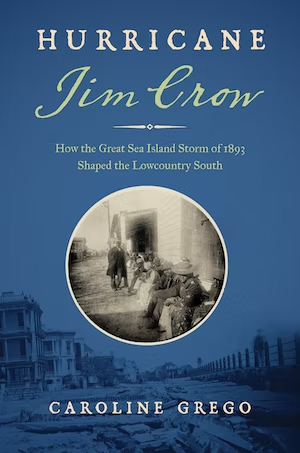In "Hurricane Jim Crow", Caroline Grego explores the painful and contradictory history of how environmental change, political repression, and communal traditions of resistance, survival, and care converged after the hurricane of 1893.

Caroline Grego, Assistant Professor of History at Queen’s University of Charlotte (USA), presented her book Hurricane Jim Crow: How the Great Sea Island Storm of 1893 Shaped the Lowcountry South (University of North Carolina Press, 2022) on Monday, 24 April 2023, at 16:00 Central European time / 10:00 Eastern in the US in the Greenhouse environmental humanities book talk series.
On an August night in 1893, the deadliest hurricane in South Carolina history struck the Lowcountry, killing thousands—almost all African American. But the devastating storm is only the beginning of this story. The hurricane’s long effects intermingled with ongoing processes of economic downturn, racial oppression, resistance, and environmental change. In the Lowcountry, the political, economic, and social conditions of Jim Crow were inextricable from its environmental dimensions.
This narrative history of a monumental disaster and its aftermath uncovers how Black workers and politicians, white landowners and former enslavers, northern interlocutors and humanitarians all met on the flooded ground of the coast and fought to realize very different visions for the region’s future. Through a telescoping series of narratives in which no one’s actions were ever fully triumphant or utterly futile, Hurricane Jim Crow explores with nuance this painful and contradictory history and shows how environmental change, political repression, and communal traditions of resistance, survival, and care converged.